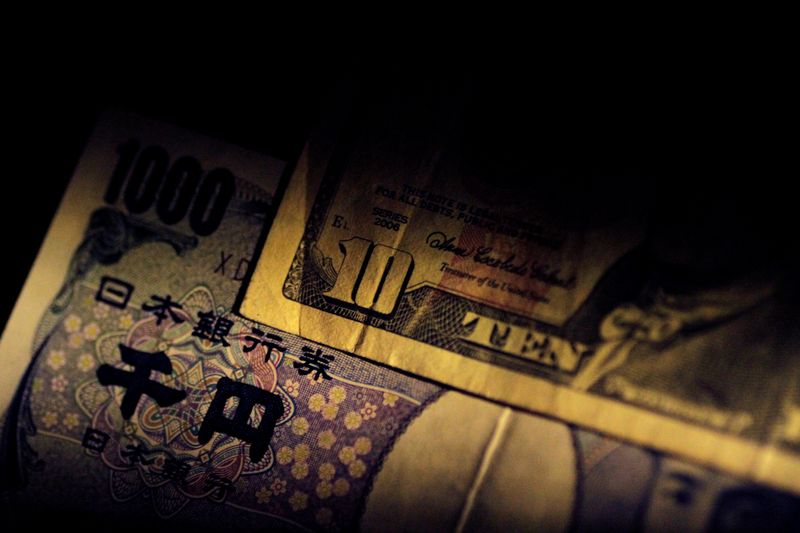By Gertrude Chavez-Dreyfuss
NEW YORK (Reuters) -The U.S. dollar rose on Tuesday, bolstered by hawkish comments from Federal Reserve officials as well as data showing a stable housing market in the world's largest economy, both suggesting that the central bank will not be in a rush to kickstart its rate-cutting cycle.
The greenback firmed against the euro, yen, Swiss franc, and commodity currencies, such as the Australian and New Zealand dollars.
Fed Governor Michelle Bowman started the ball rolling for the dollar, repeating her view on Tuesday that holding the policy rate steady "for some time" will likely be enough to bring inflation under control. She also reiterated her willingness to raise borrowing costs if needed.
Fed Governor Lisa Cook, for her part, said it would be appropriate to cut interest rates "at some point" given significant progress on inflation and a gradual cooling of the labor market. She remained vague, however, about the timing of the easing.
"If you listen to the Fed speakers, they are very shy of making too much of the one weak report that we have had given that on the aggregate we still had stronger reports since the start of the year," said Jayati Bharadwaj, global FX strategist, at TD Securities in New York.
"They sound very non-committal and ... also very data-dependent, given the uncertainty around the inflation outlook that is higher in the U.S. than elsewhere around the world."
U.S. data was mixed on Tuesday, still allowing the dollar to hold its gains.
A report showed U.S. single-family home prices increased at a steady pace in April, rising 0.2% on the month after being unchanged in March. In the 12 months through April house prices increased 6.3% after advancing 6.7% in March. That pushed the dollar a little higher.
U.S. consumer confidence, however, slightly eased in June, with the index at 100.4 from a downwardly revised 101.3 in May, according to the Conference Board. The June number, however, was marginally higher than the market forecast of 100. The report didn't really hurt the dollar.
A LOT NEEDED TO SUSTAIN DOLLAR WEAKNESS
"The weakness in some of the previous data such as retail sales and jobless claims is not really enough to spark an FX rally or dollar weakness," said Thierry Wizman, global FX and rates strategist at Macquarie in New York.
"For dollar weakness to happen, we're going to have to see not just some soft data in the U.S., but also need to see the Fed accelerate its rate cuts. We're going to have to see a divergence in data that favors the rest of the world."
Investors are now looking to Friday's release of the U.S. personal consumption expenditures (PCE) price index - the Fed's preferred measure of inflation.
In afternoon trading, the dollar rose 0.1% against the yen to 159.68 yen, clinging to a tight range. Fears of intervention from Japanese officials deterred traders from sharply selling the yen against the dollar and other currencies.
Traders remained wary of testing the 160 level that prompted a 9.79 trillion yen ($61.33 billion) currency intervention from Tokyo in late April and early May.
The latest decline in the yen has come on the back of the Bank of Japan's (BOJ) June policy meeting, where policymakers disappointed investors who were betting on an immediate reduction of the BOJ's massive bond purchases.
The euro slid 0.2% versus the dollar to $1.0714. It has come under pressure amid political turmoil in France in the wake of President Emmanuel Macron's shock snap election call earlier this month.
Against a basket of currencies, the dollar index was up 0.1% at 105.72.
Sterling was slightly higher against the dollar at $1.2693, while the Australian dollar slipped 0.1% to A$0.6649.
China's yuan was little changed against the U.S. currency at 7.2629 per dollar. It fell to 7.2631 per dollar earlier, the lowest since mid-November, and within sight of the lower end of the central bank's daily trading limit of 7.265 on Tuesday.
The yuan has never breached this threshold.
Politics was also at the forefront of investors' minds, with the first U.S. presidential debate between President Joe Biden and his predecessor Donald Trump set for Thursday and French elections due to begin this weekend.
In cryptocurrencies, bitcoin gained ground after its worst day in more than two months at the start of the week, in part due to flows out of bitcoin exchange-traded funds (ETFs), analysts said. Bitcoin was last up 4.6% at $62,182.
Currency
bid
prices at
25 June
07:08
p.m. GMT
Descripti RIC Last U.S. Pct YTD Pct High Low
on Close Change Bid Bid
Previous
Session
Dollar 105.6 105.51 0.09% 4.17% 105.78 105.
index 36
Euro/Doll 1.0715 1.0735 -0.18% -2.92% $1.0744 $1.0
ar 691
Dollar/Ye 159.62 159.695 -0.03% 13.19% 159.75 159.
n 18
Euro/Yen 1.0715 171.34 -0.18% 9.9% 171.39 170.
71
Dollar/Sw 0.8944 0.8931 0.16% 6.28% 0.8953 0.89
iss 14
Sterling/ 1.2691 1.2685 0.07% -0.26% $1.2702 $1.0
Dollar 691
Dollar/Ca 1.3653 1.3658 -0.02% 3.01% 1.3681 1.36
nadian 15
Aussie/Do 0.6648 0.6657 -0.11% -2.48% $0.6673 $0.6
llar 636
Euro/Swis 0.9584 0.9585 -0.01% 3.21% 0.9595 0.95
s 65
Euro/Ster 0.844 0.846 -0.24% -2.63% 0.8465 0.84
ling 31
NZ 0.6119 0.6124 -0.08% -3.17% $0.613 0.61
Dollar/Do 08
llar
Dollar/No 10.6077 10.5354 0.69% 4.66% 10.6228 10.5
rway 209
Euro/Norw 11.3657 11.304 0.55% 1.26% 11.369 11.2
ay 84
Dollar/Sw 10.5015 10.47 0.3% 4.32% 10.5207 10.4
eden 557

Euro/Swed 11.2528 11.2403 0.11% 1.15% 11.263 11.2
en 174